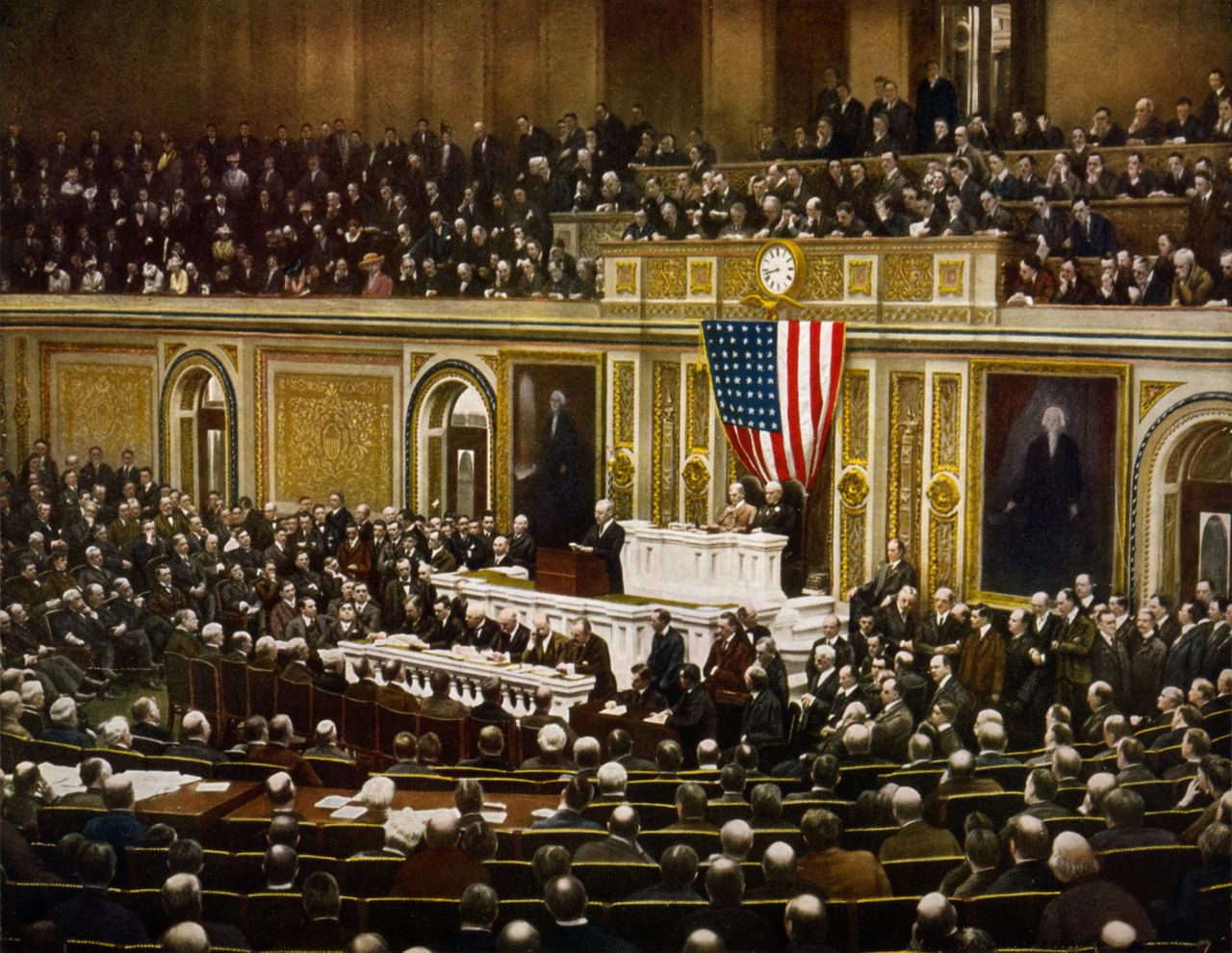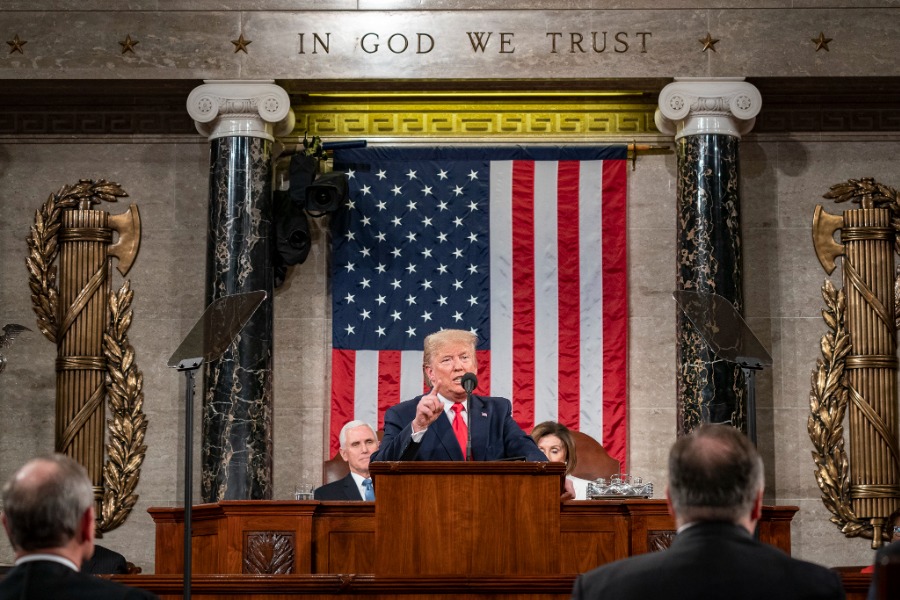How to End Forever Wars
If the House of Representatives wished to resurrect the appropriations power as a check on unwanted presidential war-making, how might it go about doing so?

Published by The Lawfare Institute
in Cooperation With

If the House of Representatives wished to resurrect the appropriations power as a check on unwanted presidential war-making, how might it go about doing so?
It’s no coincidence that Congress’s control over war-making has all but vanished at the same time that its power over the purse has devolved into an up-or-down vote on a single, gargantuan appropriations bill, the contents of which are known only to a select few. Any member wishing to revive Congress’s constitutional power to end or prevent a war by cutting off funds can do so only by voting that bill down, often with the corollary effect of shutting down the entire federal government. The quantum of political will that is today necessary to deny funds for unlawful military operations is thus vastly greater than it was during the old, “regular” order when 12 separate appropriations bills moved through committees to the floor. If Congress is to reclaim its war power in the new era of massive omnibus spending bills, it must be through a device that not only is legally effective but also amplifies existing political will.
Such a tool is available. The solution is a simple parliamentary device that can be adopted by the House of Representatives, acting alone. Making it work would require one thing: the active support of the House leadership.
The measure would amend the internal rules of the House to cause a point of order to lie against any measure that makes available appropriated funds to carry out any military operation that the House has previously found, by simple resolution, requires authorization by Congress. Call the device a parliamentary war-powers lockbox: The House would in effect lock its doors to any measure that contains any money for a designated military operation. A majority of House members put the lock in place, and any individual member can keep the lock closed.
This procedure takes its inspiration from the House germaneness rule, in effect since 1789. The germaneness rule requires a relationship between an amendment and the matter being amended. Under that rule, if a conference report contains anything added by the Senate that would have been nongermane had it originally been offered as an amendment on the House floor, any House member can rise to a point of order against the conference report—with the result that consideration of the entire conference report is precluded. The Senate has no such rule. Any senator can add nongermane material to a Senate bill in a floor amendment—in theory. But in practice, the Senate amendment will be dropped in conference to avoid subjecting the conference report to a point of order in the House. Thus does the House germaneness rule achieve “extraterritorial” reach outside the chamber itself.
A war powers lockbox would operate in much the same way. Here’s an example of how it could have worked in connection with the military action in Yemen: Earlier this year Congress passed a bill that would have required President Trump to remove the U.S. armed forces from hostilities in Yemen that have not been authorized by Congress. The president vetoed it and the Senate refused to override Trump’s veto, so the ban did not become law.
A lockbox could have changed that outcome. Had the procedure then been in effect, the House could have adopted a simple resolution finding that U.S. military operations in Yemen were unlawful without congressional approval. (A simple House resolution takes effect upon the approval of a House majority. No Senate concurrence is required, nor is a presidential veto possible.) Once that triggering resolution had been adopted, any measure that came to the House floor that makes available appropriated funds for the Yemen operations would be subject to a point of order by any House member. The presiding officer would sustain the point of order, meaning that the House would thereafter be prevented from considering the funding measure—unless the Yemen ban were included.
More likely, the war powers triggering resolution would have put the Senate and the president on notice of the upcoming House roadblock and would signal the fruitlessness of sending the House a measure that funds the Yemen military operations. The House’s message would have been clear: No ban, no bill. Should Trump want a law enacted that contains money for the Yemen operations, he would need to receive congressional authorization beforehand so as to avoid the point of order. (Signing the ban and then disregarding it would not be a presidential option: Under the Anti-Deficiency Act, any expenditure or obligation of funds not appropriated by Congress is a criminal offense.)
The lockbox procedure is potent because it amplifies political will. It does this in three ways. First, the vote on a triggering resolution occurs weeks or months before any high-pressure, crisis-laden vote on an omnibus spending bill—which, again, may not even be cobbled together in the face of this impending point of order. (After signing a 2,232-page, $1.3 trillion behemoth in March 2018, Trump said he would never again sign such a bill.) Second, the vote on the triggering resolution is not a vote on an omnibus spending bill, let alone on whether to shut down the government: It is a vote to require congressional authorization of U.S. involvement in a war, which may have been enacted by the time spending legislation reaches the House floor. Third, if Congress hasn’t approved the military operations by then, only one member, not 218, must muster the political will to block funding. The lockbox’s value-add thus lies in setting up a vote on a different issue months earlier that can later be enforced, if necessary, by a single representative—providing a way out of the game of chicken that has hobbled Congress in drawing the purse strings on unwanted wars ever since it abandoned the regular order in legislating appropriations.
Omnibus spending bills are not, of course, the only stumbling block Congress faces on war powers. Efforts in the House to halt or prevent unauthorized military operations have foundered on five additional reefs: presidential vetoes, opposition in the Republican-controlled Senate, specious statutory interpretation, judicial abstention and constitutional limits. The war powers lockbox would avoid each:
- The president would not be able to veto the initial House resolution that gives rise to the point of order because that resolution would, again, take immediate effect upon its adoption by the House. The president, of course, could still veto legislation that includes the ban. But if he wants that legislation enacted, there would be little point in doing so, because he would know that, with the lockbox in effect, the House wouldn’t even consider pertinent legislation that lacks the ban.
- Similarly, Senate objection to the House’s initial triggering resolution would be irrelevant. Like the president, the Senate can’t control the internal parliamentary effect the House gives to the triggering resolution.
- The president and the Senate might contend that the military activities in question had earlier been approved by Congress—in, for example, the 2001 Authorization to Use Military Force. The House’s triggering resolution might embody its own, opposite interpretation of that law. But disagreement would not matter; regardless of who’s right, Congress constitutionally could still cut off funds, as it did in ending U.S. military operations in Vietnam even though the legality of those operations was disputed. Congress’s appropriations power is independent of and broader than its war power.
- Time-consuming litigation before judges who are habitually deferential to the executive would be unnecessary. Enforcement would occur when the speaker’s gavel bangs down and upholds the point of order.
- As to constitutional limits, the Supreme Court ruled in 1983 that the Constitution prohibits giving external legal effect to a measure not subject to a potential presidential veto. But that ruling would pose no obstacle because, again, all legal effects of the triggering resolution would be limited internally to the House.
Earlier efforts to limit presidential war power, such as the War Powers Resolution, relied on constitutional authority Congress shared with the president as commander in chief. The attractiveness of the point-of-order procedure is that it would rest on exclusive congressional powers. Each house of Congress, the Constitution provides, “may determine the Rules of its Proceedings.” This grant of authority, the Supreme Court held in 1892, is “absolute and beyond the challenge of any other body or tribunal.” Congress is, in addition, granted exclusive power over the purse. “No money,” the Constitution provides, “shall be withdrawn from the treasury, but in consequence of appropriations made by law.” The House has a special role in financing government activities: “All Bills for raising Revenue,” the Constitution requires, “shall originate in the House of Representatives.” And of course the Constitution gives the House and the Senate power to declare war.
The lockbox device would be novel, but it is not new. An approach founded on the House germaneness rule has been deployed in earlier proposals. Then-Sen. Joe Biden introduced legislation in 1998 that would have amended the rules of both houses of Congress to cause a point of order to lie against legislation that would fund any use of force that they specified to be unlawful. The Senate Foreign Relations Committee, in 1978, reported a measure that would have caused a point of order to lie in the Senate against legislation to fund an executive agreement that it had earlier specified was required to be submitted to the Senate as a treaty. The same measure, sponsored by Sens. Frank Church, Dick Clark, Edward Kennedy and Walter Mondale, had been introduced in 1976. For reasons unrelated to the proposed lockbox, none of these measures was adopted. But the tools belong to the legislature that can use them.
The lockbox procedure would not be a parliamentary straitjacket. The triggering resolution wouldn’t necessarily have immediate operational effects. It wouldn’t bite until funding legislation actually comes up, which could be months after the triggering resolution is adopted; an impending, future point of order wouldn’t block money already in the pipeline. The lockbox would not be automatic, unlike the War Powers Resolution’s 60-day cut-off. If a majority of House members wish to fund a given war, the procedure would not prevent them from doing that. And it’s not irreversible. Unlike a law, an internal parliamentary rule is easily changed. All that’s needed would be a majority vote in the House, where the rules are whatever 218 members say they are.
Still, an effective war powers lockbox would require the committed backing of the House leadership. In recent years, points of order against omnibus spending bills have been routinely set aside in the House under special rules waiving points of order. For the lockbox to work, the Rules Committee would need to fashion special rules that exempt the lockbox’s point of order. Nothing in House practice or procedure would prevent the committee from doing so, though smoothing unexpected bumps along the way would require leadership’s support.
Congress’s war and appropriations powers have atrophied for many reasons, and no single legislative measure can fully and finally restore either. But the need for a more active congressional role is clear. In the past decade alone, presidents have ordered military operations in Afghanistan, Iraq, Syria, Yemen, Somalia, Libya and Niger—all, save Afghanistan, without congressional authorization. Iran might be next, or North Korea. Funds for these actions are constitutionally required to be approved by a majority of each House of Congress. “Procedure,” the late Judge Harold Leventhal said, “is the first outpost of the law.” A first step in revivifying the constitutionally mandated procedure for going to war is to avoid funding wars that do not honor that procedure. The House of Representatives can do so by exercising its exclusive authority over its internal procedure.


.jpg?sfvrsn=6cdd11de_5)

